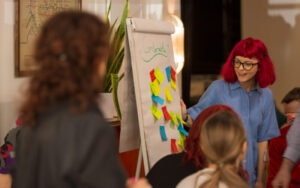Love isn’t a word you often hear in professional contexts. For many, the workplace is a space defined by objectives, performance metrics, and deadlines—hardly the terrain for something as vulnerable or intangible as love. Yet, as businesses continue to evolve, the conversation about what it means to bring humanity into the workplace has grown louder.
What does love look like in the workplace? It’s not romantic or sentimental in this context but instead emerges as a guiding force that fosters trust, empathy, respect, and connection. When paired with the feminine traits of curiosity, inclusion, and long-term vision, love becomes a catalyst for sustainable success and thriving teams.
Let’s explore how love can be defined in a professional setting, how the integration of the feminine voice elevates workplace cultures, and how tools from the ORSC (Organisation and Relationship Systems Coaching) methodology, like The 3rd Entity, can help teams make love a guiding principle for collaboration and problem-solving.
What Does Love Look Like in a Professional Setting?
In professional environments, love manifests as a set of values and actions that create meaningful relationships and foster an environment of care and connection.
Love in the workplace includes:
- Empathy: The ability to understand and respect the emotions, perspectives, and experiences of others. Empathy nurtures psychological safety and creates space for authentic connections.
- Trust: Building environments where individuals feel secure expressing their ideas, asking questions, and admitting mistakes without fear of judgment.
- Connection: Fostering relationships where team members genuinely support one another and align around shared goals.
- Respect: Valuing diverse perspectives, backgrounds, and skills, and recognising how they contribute to collective success.
- Care: Demonstrating a genuine commitment to the well-being of others and the health of the team.
Love in this context creates the foundation of psychological safety, which research has shown is essential for high-performing teams. According to Google’s Project Aristotle, psychological safety is the most critical factor in team success, enabling openness, risk-taking, and innovation.
Integrating the Feminine Voice: A Balance of Results and Care
In traditional business settings, the masculine drive for results, decisiveness, and action often takes precedence. While these qualities are important, they can lead to short-term thinking, competition, and burnout when not balanced by the feminine voice, which emphasises curiosity, collaboration, and long-term purpose.
When the feminine energy of care and inclusion informs the masculine push for results, something powerful happens:
- Cultures of Collaboration: Instead of competition dominating workplace dynamics, a sense of connection and shared purpose emerges.
- Innovation Through Curiosity: Feminine curiosity encourages teams to question the status quo, explore new ideas, and innovate in ways that align with purpose and sustainability.
- Sustainable Growth: The feminine focus on long-term vision ensures that goals are achieved without sacrificing relationships or values, leading to growth that benefits everyone.
In workplaces where love is guided by this balance, teams thrive not because they prioritise care over results, but because they integrate both.
The Role of ORSC Tools in Fostering Love in the Workplace
Relationship Systems Intelligence (RSI) and ORSC tools provide actionable frameworks to help leaders and teams embed love into their day-to-day interactions. By treating the “relationship” itself as a dynamic system, these tools create environments where collaboration, care, and respect become second nature.
- The 3rd Entity:
The 3rd Entity tool helps teams shift their focus from individual perspectives to the collective needs and goals of the team system.
- How It Works: Teams or leaders can use the 3rd Entity framework to ask questions like, “What does the team need right now?” or “What is best for the relationship system?” This collective lens allows love to emerge as a shared guiding principle, rather than an individual responsibility.
- Example: A team struggling with conflict could use the 3rd Entity to identify what the system as a whole needs to move forward, rather than focusing on who is right or wrong.
- MetaSkills Framework:
The MetaSkills framework encourages leaders to adopt intentional attitudes, such as curiosity, compassion, and intentionality, which create a foundation for relational success.
- How It Works: Leaders consciously cultivate these mindsets, bringing both care and decisiveness to their actions.
- Example: A leader might approach a team setback with curiosity instead of frustration, asking, “What can we learn from this?” rather than assigning blame.
- Designed Team Alliances (DTA):
DTAs enable teams to co-create agreements about how they will collaborate, communicate, and support one another.
- How It Works: Teams collectively decide on their shared values and how they want to interact, establishing trust and alignment.
- Example: A team might include values like “Assume positive intent” or “Prioritise respect in disagreements” in their DTA, ensuring that care is built into their dynamics.
Love as a Strategic Advantage in the Workplace
Love in the workplace is not a weakness—it’s a transformative strength. When love, guided by the feminine voice, becomes part of a workplace culture, the benefits ripple across every level:
At the Team Level:
- Stronger Collaboration: Teams that operate with trust and empathy collaborate more effectively, leveraging diverse perspectives.
- Higher Engagement: Employees who feel valued and supported are more motivated and committed.
- Enhanced Innovation: Love fosters psychological safety, which encourages creativity and bold problem-solving.
At the Leadership Level:
- Effective Leadership: Leaders who model love through empathy and respect build stronger connections with their teams.
- Better Communication: Love enables open, transparent dialogue that reduces misunderstandings and fosters alignment.
- Resilient Teams: Leaders who prioritise care help their teams navigate challenges with greater adaptability.
At the Business Level:
- Higher Retention Rates: Employees are more likely to stay in organizations where they feel genuinely cared for.
- Better Performance: Companies that integrate relational values consistently outperform those that prioritize short-term gains over connection.
- Positive Culture: A workplace infused with love attracts top talent and builds a reputation as a desirable place to work.
Key Takeaways: Redefining Love in the Workplace
Love in the workplace isn’t about sentimentality—it’s about fostering trust, connection, and care to create high-performing teams and sustainable cultures. By integrating the feminine voice of curiosity, inclusion, and long-term vision with the masculine drive for results, workplaces can achieve more than just short-term success—they can build lasting impact.
Tools like The 3rd Entity, MetaSkills, and Designed Team Alliances offer actionable ways to embed love into professional environments, transforming relationships and unlocking potential.
Are you ready to lead with love? Discover how the ORSC methodology can revolutionise the way you work, lead, and connect.






